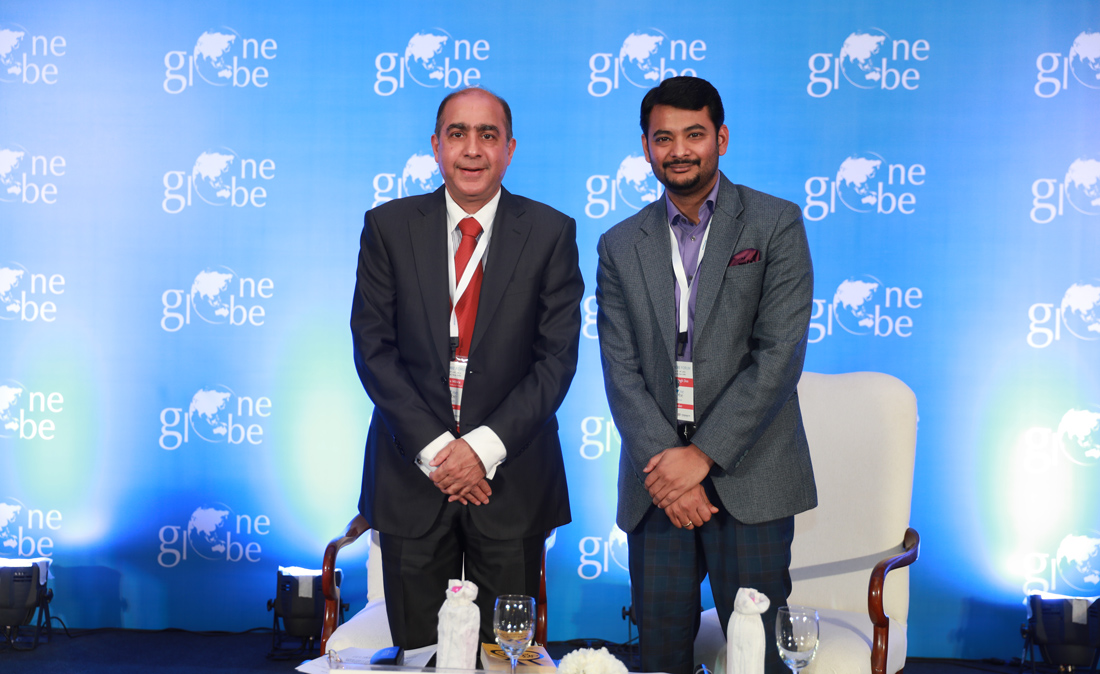Fireside Chat: India's Olympic Ambitions: Turning Dreams into Reality
Posted by Admin on August 21, 2018By: Skendha Singh

Dr. Jitendra Nath Misra, former Ambassador to Laos and Portugal and Mr. Digvijay Singh Deo, Author of ‘My Olympic Journey'
The Fireside Chat on India’s Olympic Ambitions: Turning Dreams into Reality at One Globe Forum 2018 began with a question by moderator, Dr. Jitendra Nath Misra, former Ambassador to Laos and Portugal, about how many in the audience participated in sports?
A few hands were raised in response. Mr. Digvijay Singh Deo, Author of ‘My Olympic Journey” 50 of India’s Leading Sportspersons on the Biggest Test of their Career’, suggested that this was the problem with Indian sport – not many people are playing it. As an example, he reminded the audience of the recent PyeongChang Winter Olympics where the Indian contingent consisted only of two athletes: Shiva Keshavan, competing in luge in his sixth and final Olympics, and Jagdish Singh, a cross-country skier from the army. Mr. Deo said this was a telling indication of where India stands as a sporting country.
Dr. Misra asked, “Is it about money? India spends 30 paise per day per capita on sport according to an Indian parliamentary report, whereas China spends 6 rupees!” The difference is staggering – approximately 200 times. Mr. Deo responded, “More than the money, the question is – are we serious about sport?”
The problem in Indian sport is not just of infrastructure. The lack thereof cannot be cited as the main reason for India’s dismal performance at the Olympics. The panelists talked about Anna Korakaki, the Greek shooter. She famously trained in a humble makeshift target site created by her father and went on to win two Olympic medals in Rio.
Stories like these establish that success in sports is not just about infrastructure but also intent and initiative. The right initiatives need to be in place to ensure that India harnesses its sports potential. As an example, Mr. Deo spoke about the Khelo India School Games, which will be held annually starting 2018. Although it seemed a move in the right direction, Mr. Deo was skeptical about its results - “Do you expect to pick up athletes at the age of 17 and expect them to be Olympic champions in two years? No! We should have athletes knocking at the top level of world sport by the age of 17-18. Boris Becker won Wimbledon at the age of 17.” Starting early at the grassroot level is imperative if India wants to realise its Olympic ambitions.
The panel discussion veered to a central problem in Indian sports – brain fade, which is a temporary inability to concentrate or think clearly. Today, it is a commonly known phenomenon. In Mr. Deo’s recently published book, which comprises case studies of famous Indian athletes, such as Anju Bobby George, Anjali Bhagwat, Ashwini Ponnappa, Aparna Popat, and Gagan Narang, brain fade moments are numerous.
Both Dr. Misra and Mr. Deo agreed that brain fades have plagued Indian sports for many decades. For example, in 1948, triple-jumper Henry Rebello made the elementary mistake of not warming up before his performance, pulled a hamstring, and as a result failed to win a single medal. In 1984, P.T. Usha made the elementary error of not lunging forward at the start. She lost the bronze medal by 1/100th of a second. Dr. Misra also referred to Karnam Malleswari who competed in the 2000 Sydney Olympics and is the only Indian woman weightlifter to ever win an Olympic medal. The panelists agreed that if she had lifted 2 kilograms less she could possibly have won the gold. It was a case of bad athlete management.
These cases clearly demonstrate not a lack of potential but a lack of management. Unless an athlete is guided and managed properly, the panelists said, they cannot reach the pinnacle of success. For this, the coaches also need to be trained. Their pay package must be respectable, and they must undergo training in their discipline as consistently as the athletes. Citing the example of Abhinav Bindra, who won the gold medal at the 2008 Summer Olympics in Beijing, Mr. Deo emphasized that to make the final mile in sports, a different approach was needed. “You just can’t shoot 50 rounds a day and become an Olympic champion. There has to be a holistic approach. There has to be mental training. There has to be physical training. There has to be training on how to deal with questions.”
If India has Olympic ambitions, the Indian athlete cannot afford to be cocooned as in the past. “These are fundamental aspects which come in that 10%, which we do not focus on. . . Indian athletes are not trained in [handling] pressure at the top level.” Naturally, this translates as missed opportunities.
Then there is the question of drive. Mr Deo said, “We seem content with winning that one Olympic medal. No Indian, apart from Sushil Kumar, has actually gone on and won two Olympic medals. We’ve had the talent. We’ve come close. But, I think, it’s the hunger. . .” Unlike athletes from the UK, US, Russia and China, Indian stars often fade into oblivion after a single success. The government must recognize that talent must be nurtured and sustained long-term. Only then can India reap rich dividends in sport.








